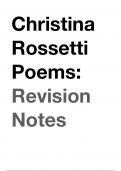Christina
Rossetti
Poems:
Revision
Notes
,List of Rossetti Poems
1.‘Song: When I Am Dead my
Dearest’
2.‘Remember’
3.‘From the Antique’
4.‘Echo’
5.‘Shut Out’
6.‘In the Round Tower at Jhansi’
7.‘A Birthday’
8.‘Soeur Louise de la Miséricorde’
9.‘Maude Clare’
10.‘Up-Hill’
11.‘No, Thank You, John’
12.‘Good Friday’
13.‘Goblin Market’
14.‘Twice’
15.‘Winter: My Secret’
,When I Am Dead My Dearest
This is a ballad (song) poem about death and mourning, with the
speaker urging a loved one not to waste too much time grieving for her
when she dies. It is a dirge, a mourning poem.
Themes
Love, Death & Mourning
- The speaker urges her loved one not to waste too much time on
her, as it is more tasking for them, who is alive, than her, who is
dead. Instead all the speaker needs above her is green grass and
dew, in turn, nothing special. It also could be a metaphor for the
world moving on and changing without her, and could be symbolic
as it suggests the her beloved will and should move on.
Context
• Rossetti was a devout Christian, and contributed to theological
debates, and she is talking about the doctrine of soul sleep. This is
believed to be a period between your death and the day of your
judgement, your soul is in a state of limbo where it’s waiting for the
second coming of Christ and judgement. ‘Dreaming through the
twilight that doth not rise nor set’ alludes to this idea of being
medial.
• Could be linked to Andrew Marvell’s ‘On a Drop of Dew’, where he
uses the metaphor of a dew drop to depict the impermanence of
the soul. He wrote in the 17th century
Quotes
- ‘haply I may remember and haply may forget’
- ‘I shall not see the shadows’
Massolit Videos
• The lines of the poem are all negations. They are telling the address
what not to do. ‘Sing no sad songs’, ‘Plant thou no roses’. Rossetti
is shadowing out a alternative poem, and negating it.
• The second and fourth lines often rhyme in a ballad, hence making
it possible to recognise ‘When I Am Dead My Dearest’, as one.
, • The poem imagines death as a sort of intermission, like a break,
from all the unfortunate changes in the world. In ‘I shall not see the
shadows, I shall not feel the rain’, the world is portrayed as a
gloomy place, lled with shadows and rain. The speaker is relieved
to be excused from the harshness of the earth.
• She also describes not hearing the ‘nightingale’, following traditions
of the nightingale being a songbird singing out its pain. A reference
to the story of Philomela from Ovid’s Metamorphoses, who is
sexually assaulted and has her tongue cut out to prevent her from
talking about her attack, but is turned into a nightingale, a bird
renowned for its song.
Comparison to A Doll’s House
• When Dr Rank mentions about Torvald, “I don’t want him to visit me
when I am in hospital”, in the same instructional tone. He too
protects his presumed ‘loved one’ from the grievances of death.
• Opposing the possessive nature of Torvald and Nora’s relationship,
the speaker urges their loved one to let them go in their death as
they are moving on to a better place. While Torvald mourns his
ending marriage with Nora (head bent, on the oor), the speaker is
celebrating and urging their loved one to move on.
• Contrasts the brutish imagery of Krogstad to Nora about death, he
regards her body as ‘ugly, unrecognisable, hairless’ down in the
‘cold, black water’, while Rossetti’s imagery is quite idealistic and
natural; ‘shady cypress tree’, ‘showers and dewdrops’.
Di erent Interpretations
- Andy Haley: ‘This is a work that may have arisen out of her health
problems’
ff fi fl




